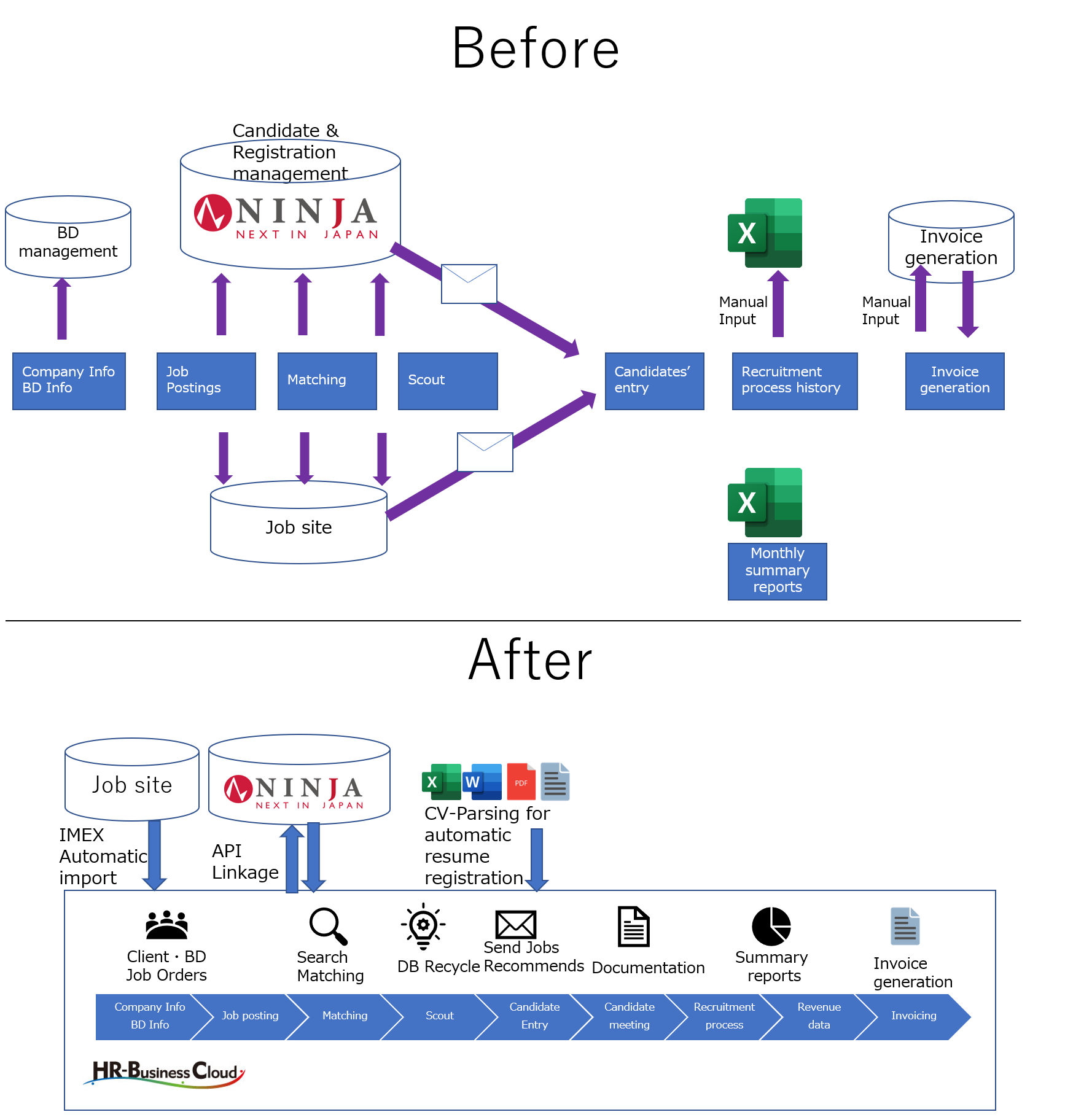A system with excellent cost efficiency and product power
Global Power Inc. is a recruitment company specializing in foreign nationals. The consultants are well versed in immigration law and offer advice tailored to the needs of client companies. The company switched from an in-house system to HRBC to manage job seekers’ data. We interviewed Ms. Toshishige about the background to the implementation of HRBC and what kind of results have been achieved since then.
――First, please tell us about your business.
We are a Recruitment and Staffing company specializing in foreigners living in Japan who are fluent in Japanese. The job functions are mainly office work and customer service such as sales representatives. As the company characteristic, all employees receive two hours of training every month from an administrative scrivener who acts as an application agent for foreign workers and is also a professional in immigration law. For a foreigner to obtain residence status, permission must be granted for both “person” and “job description”. If you don't understand the Immigration Control and Refugee Recognition Act, you may not be able to obtain your status of residence, and your job start date may be delayed or rendered unable to work. Our consultants are well versed in immigration law and can advise companies on what to do.
――What were the challenges before introducing HRBC?
At first, we used to use Excel, then FileMaker to manage our job seekers’ information. NINJA was originally developed in-house to attract clients, but we added a management function to allow search of our job seekers’ database. However, there were many bugs and the search function was weak. There were a number of features that were missing from our system, so we decided to implement a dedicated system.
――Why did you choose HRBC?
When I spoke to a sales representative at Porters, I felt that HRBC is a system that reaches out to the right spot, and the cost efficiency is good. In addition, Porters has been providing specialized systems for recruitment industry for many years and the system has been implemented by more than 1,500 companies. I assume the reason why they are chosen is its product power. Since the development and support system is well organized, we felt that the product would be constantly evolving and that there would be no problems in responding to legal revisions.

Work that took one day now takes an hour
――Did the implementation of HRBC solve your previous issues?
Yes, NINJA could also register and manage job seekers' data and create job descriptions, but it didn't have a strong search function. That's why it was so difficult to find talented people in the system, even though there were so many talented people registered. With HRBC, of course you search, as well as do matching with jobs. I also find the high level of customization useful. Since most of our registrants are foreign nationals, there are things to keep in mind such as residence status and granted period of stay. Even if you're not familiar with the system, it's useful to be able to add fields at our will.
――What specific results have been achieved since the implementation of HRBC?
It has greatly increased our work efficiency. In the past, our consultants handled job seekers’ correspondence via email. We had to manually search and respond to them one by one to see which jobs the job seekers had applied for. For many, it took a whole day. After implementing HRBC, it was reduced to about an hour per day because we only sent out emails using templates.
――What used to take one day to do can now be done in an hour. That's considerably made short!
Yes. At the end of the month, we had to compile all kinds of numbers, but what used to take a full day was reduced to an hour or two with HRBC's report function. For the CA (Career Advisor), we would check “how many candidates each CA submitted to clients”, while for RA (Recruitment Assistant), we would track “how many client meetings were held and how many candidates were submitted”. I'm a web administrator myself, so I check, “How many new registrants there are, how many of them are via NINJA, and how did they know about NINJA”. The managers have different indicators to check depending on their positions, such as “number of applicants per job” and “number of candidate submittals per consultant”, but all of these indicators can be aggregated and checked by HRBC.
We are a team of 20 people excluding temporary employees. I, as the president, and my managers are all players in the company and do the aggregation and other KPI related tasks by ourselves. In addition, sometimes I was unable to work overtime after the birth of my second child, so I wanted to automate the work that could be done via HRBC and focus on tasks that only human beings can do, I was able to make that change with the implementation of HRBC.

A core system should be introduced from the start-up stage
――Are there any other useful features?
We can now manage our data centrally. In the past, NINJA did everything from job acquisition to matching and head hunting, while we managed the recruitment progress by Excel. From new sales approaches to job acquisition, we used yet another mechanism for management. After the implementation of HRBC, we were able to consolidate the unique processes of recruitment all the way to invoicing in one system, leading to increased efficiency.
I've also had clients during client meetings ask me, “How many candidates have this qualification?”, or asked to make a list of people who can speak Chinese, English and Japanese and also have sales experience. I couldn't make any list on NINJA, so I had to find the right people manually and copy and paste the data into Excel one by one. With HRBC, it is now possible to extract and list of people by mouse click, making it easier to convey to clients the image of the candidates. Invoices for the placements made can be generated from HRBC by mouse click too.
The most helpful function is that I can see the entire selection process, who did what and when, and this feature was shocking to us since Excel only shows the results.
――Please give some advice to companies that are considering implementing a system in the future.
We've been using Excel, FileMaker, NINJA, and HRBC to manage data, but I've always spent a lot of time switching and migrating data, and I've had problems during such process. If the data cannot be successfully uploaded to the system, the option will be not to update the previous data, so the past data is effectively discarded. In the end, the data remains only in the consultant's head or in his or her personal email. If we had implemented HRBC from the beginning, we would have had all the data.
Many recruitment companies probably think that “a system should be implemented when the organization grows”. If that's the case, the more data you have, the harder it will be to migrate and implement and there won't be any data left over from the consultants who quit. Also, you cannot standardize the skills of the consultants. Therefore, the system should be put in place while there is only a small number of people and the data should be managed centrally. HRBC has a monthly fee per account, so the implementation cost is low.
――Finally, what are your future requests for HRBC?
It would be more convenient if it could be linked to chat services such as WeChat and LINE, etc. Emails can be difficult for job seekers to see, and responses can be slow. If we can link WeChat or LINE, all communication between the consultants and job seekers will be transparent for anyone to check.
Also, when you send multiple job descriptions from HRBC, you need to change the recruitment phases one by one, but it would be convenient if we could do that all at once. Also, if we can enhance the functions of the SFA (sales support system), we will be able to centrally manage all data and make it more convenient.
――Thank you very much.
 GLOBALPOWER Inc.
GLOBALPOWER Inc.
GLOBALPOWER Inc.
https://globalpower.co.jp/
Akihabara Sawa BLDG 5F・7F
1-10-6 Taito Taito-ku, 110-0016, Tokyo Japan
Tel.03-3836-9685
Established in 2004. Recruitment and Staffing of foreign personnel who are fluent in languages, to job functions such as overseas sales department, trade affairs, and customer service to tourists visiting Japan. The company operates a foreign employment information site “NINJA”, which boasts a high profile to foreigners living in Japan and has a database of about 40,000 foreign human resources throughout 134 countries. Consultants who are familiar with foreign employment and visa procedures support the employment of foreigners.















